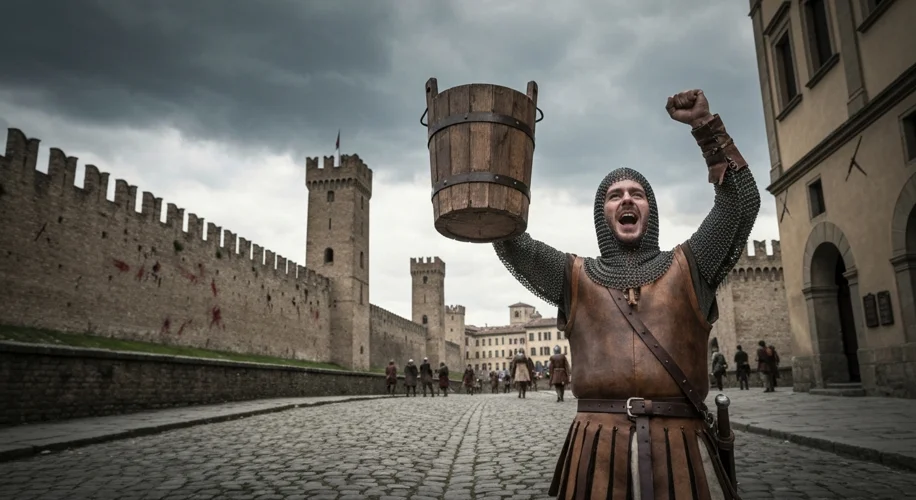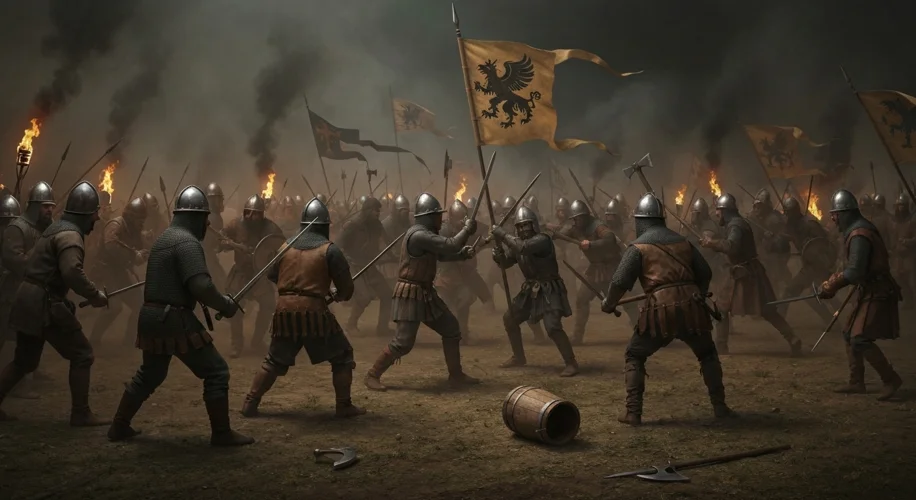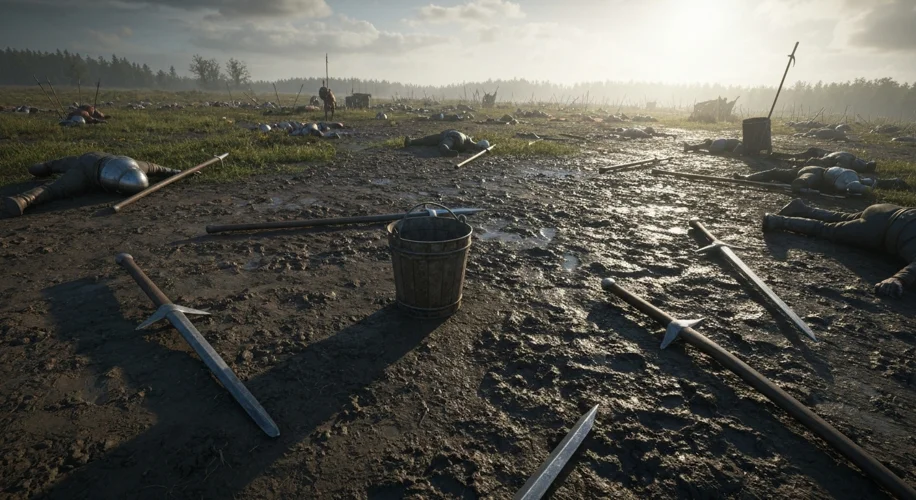Imagine this: the year is 1325. Italy, a fractured land of powerful city-states, each vying for dominance, prestige, and, as it turns out, a simple wooden bucket.
Today, we delve into a conflict so peculiar it sounds like a jest, yet it was a very real, albeit brief, war that pitted two wealthy city-states against each other: Bologna and Modena. It’s known to history as the War of the Bucket, a name that, while amusing, belies the complex political currents and bitter rivalries that fueled the flames of conflict.
A Spark Ignites in a Divided Italy
To understand the War of the Bucket, we must first grasp the vibrant, yet volatile, atmosphere of 14th-century Italy. This was a period of intense city-state competition. Florence, Milan, Venice, Genoa – these were not mere towns, but powerful, independent entities with their own armies, economies, and ambitions. Bologna and Modena, nestled in the Emilia-Romagna region, were no different. They shared a border, a proximity that bred both trade and, inevitably, friction.
Beneath the surface of their rivalry lay a history of territorial disputes, political maneuvering, and a deep-seated animosity that had simmered for generations. The political landscape was further complicated by the involvement of larger powers, such as the Papacy and the Holy Roman Empire, whose influence often manipulated the local squabbles for their own gain. Bologna, a university town with a burgeoning population, often found itself on a different political and economic trajectory than its neighbor, Modena.
The Tale of a Stolen Bucket
The story, as it is famously told, begins with a raid. Modenese soldiers, perhaps emboldened by wine or a desire to needle their rivals, stealthily entered Bologna in 1325. Their objective? Not gold, not territory, but something far more mundane: a wooden bucket. This particular bucket, reportedly taken from a public well in Bologna, became a trophy, a symbol of Modenese audacity and Bolognese humiliation.

When the Bolognese discovered their precious bucket missing, the outrage was immediate and profound. It wasn’t just about the loss of the pail itself; it was about the insult, the perceived disrespect from their neighbors. The bucket, now proudly displayed in Modena, became a potent symbol of their victory, a constant reminder to Bologna of its alleged weakness.
Bologna, unwilling to let such an affront stand, issued an ultimatum: return the bucket or face war. Modena, perhaps underestimating the depth of Bolognese fury or simply unwilling to concede, refused. The stage was set.
The Belligerents and Their Causes
While the bucket was the immediate casus belli, the underlying reasons for the war were far more substantial. Bologna, feeling its honor and territorial integrity challenged, saw this as an opportunity to assert its dominance and perhaps reclaim disputed lands. Modena, on the other hand, likely saw the bucket as a minor indignity, a piece of playful antagonism that had escalated far beyond its intention. Yet, for Modena, returning the bucket would be an admission of guilt and a potential sign of weakness in the eyes of other city-states.
The actual military strength of each side also played a role. Bologna, with its larger population and arguably greater resources, felt confident in its ability to punish Modena. The key actors were the city leaders, the military commanders, and the common citizens who would bear the brunt of the conflict. For the soldiers marching out, the initial impetus might have been the bucket, but as they neared the battlefield, the older grievances, the territorial disputes, and the simple desire for victory likely took precedence.
The Battle of Zappolino: The Bucket’s Legacy
While the war is named for the bucket, the most significant event was the Battle of Zappolino, fought on November 15, 1325. This clash saw Bologna muster a formidable army, estimated to be around 32,000 men, against Modena’s force of approximately 7,000. The numbers alone suggest a decisive victory for Bologna.

However, the battle proved to be anything but a simple rout. Despite being vastly outnumbered, the Modenese soldiers, fighting on their home territory and perhaps fueled by a fierce determination to defend their city and their stolen prize, put up a valiant fight. The battle was bloody and hard-fought, with Bologna ultimately achieving a tactical victory, pushing into Modenese territory.
Yet, in a twist of fate that underscores the absurdity and the deep-seated nature of the conflict, the Bolognese army, despite its battlefield success, failed to achieve its ultimate objective: the recovery of the bucket. Reports suggest that when Bologna’s forces entered Modena, the bucket was hidden away, or perhaps it had already been moved, ensuring it remained out of Bolognese hands.
Consequences: A War for Nothing?
The War of the Bucket was remarkably short-lived, with most hostilities concluding by the end of 1325. The Battle of Zappolino resulted in heavy casualties, particularly for Bologna, which suffered an estimated 2,000 dead compared to Modena’s perhaps 1,500. Despite Bologna’s tactical victory and the Modena army’s retreat, the war ended without a clear resolution regarding the bucket or significant territorial gains.

The bucket remained in Modena, a lasting symbol of their defiance, while Bologna was left to mourn its dead and ponder the futility of the conflict. The deeper political and territorial issues remained largely unresolved, swallowed by the greater currents of Italian city-state politics.
Echoes Through Time: More Than Just a Bucket
Why does the War of the Bucket resonate through history? It serves as a potent reminder that even the most trivial-seeming incidents can ignite conflict when layered upon existing grievances and political tensions. It highlights the complex web of pride, honor, and territorial ambition that defined medieval Italy. The bucket, a simple object of utility, was transformed into an emblem of national identity and defiance for Modena, and a symbol of unbearable humiliation for Bologna.
Historians often point to the War of the Bucket as an example of how seemingly minor disputes can escalate into open warfare, particularly in a fragmented political landscape where honor and reputation were paramount. Little did the soldiers who raided Bologna that fateful night in 1325 know that their pilfered pail would one day be remembered as the cause of a war, a testament to the often-unpredictable nature of history and the peculiar things that can drive nations to conflict. It’s a story that reminds us that history is not just made by kings and generals, but sometimes, by a simple, stolen bucket.

